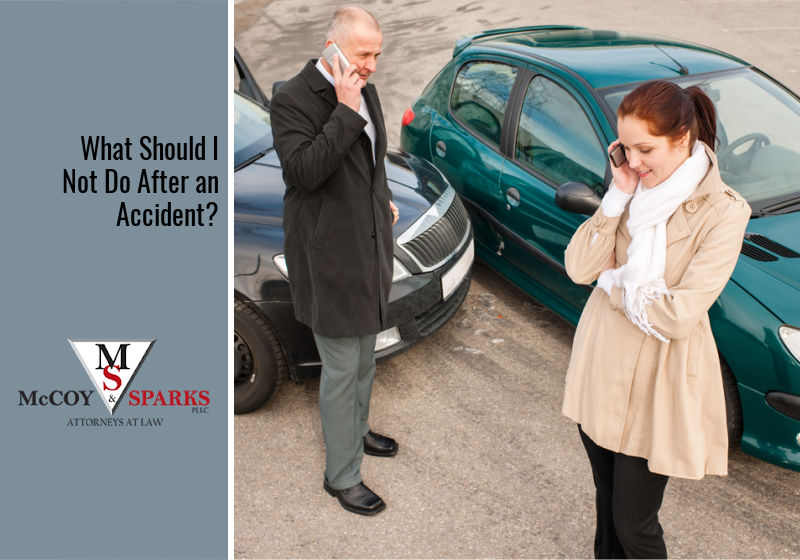
After an accident occurs, we have been told a long list of things we always should do; for instance, remain on the scene, seek medical treatment, call the police, exchange contact information, take photographs, etc.
But what about the things you shouldn’t do?
One of the worst things you can do after an accident is talk too much.
Stick to the Facts
Oftentimes, we are jittery and nervous after an auto accident, and we especially can be upset if injuries occurred. Human nature often takes over in these situations, and we often will try to explain away what happened, apologize for things that aren’t our fault or give as much information as possible—even when we don’t have that much information to give.
Here’s why that’s bad when it comes to your personal injury claim.
- Overexplain what happened.
Too often, individuals try to explain what happened in the accident when they themselves don’t know. Accidents can happen in a split second, so it’s only natural that we aren’t always exactly sure what led to them. If you know that you ran a red light, that’s one thing—but trying to find a logical reason why the accident occurred while talking aloud could end up leading you to admit to fault that wasn’t even yours.
For example: “I saw him running the red light, and I knew I should have stopped, but I didn’t.” In a split second, it can be hard to stop the car when you’re doing what’s correct even if you see another car running a light and heading towards you. But by announcing that you saw the driver at fault and continued anyway, leading to the accident, you’ve actually admitted to comparative negligence, which will lessen the value of your claim.
- Apologize.
It’s also human nature to apologize when harm has been caused, whether or not we truly contributed to it. Apologizing may seem like the nicest thing to do, but in reality, it reads as taking responsibility for the accident or parts of the car accident, which again, can be used to point fault at you.
- Provide too many details, even ones you’re not sure of.
Similar to point No. 1, we sometimes will share more than is necessary out of excitement or nervousness when involved in an accident. This also can lead us sometimes to try to “fill in the blanks” of what we don’t know, and we end up giving details that aren’t 100% factual. This can come back to be a problem for you if things you say in the moment are proven not to be true. Because of this, it’s better to share only the basic facts of what happened and only to answer questions you are asked.
It’s OK to be shaken up by an accident, and it’s OK not to provide a full statement on the scene of an accident. As long as you are able to give as many facts as possible without providing conjecture, you’re within your rights.
Remember, if you’re calm and clear about what you do know, you always can ask the police officer if you are able to get his card and call and provide more information once you’ve calmed down.
- Avoid Sharing on Social Media
Another thing you should avoid after an accident is sharing details about it on social media. You may think you are venting to your closest family and friends, but insurance companies and attorneys can access what you post—even if it’s private—if wanting to contest your claims.
Because of this, it’s best to keep your emotional reactions to an accident, any photos of the accident including property damage or injuries, persons involved, and details of what happened to yourself until discussing the case with a personal injury lawyer.
Trust McCoy & Sparks—Premier Personal Injury Attorneys in Nelson County
Recognized as Nelson County’s best law firm for over a decade and counting, McCoy & Sparks works to help people in trouble, representing thousands of clients in Central Kentucky with a focus on providing premium service and delivering superior results.
Regardless of the type of case, our goal is to develop a strategy that best serves your personal needs, then draws upon our courtroom skills to help you reach the best possible result. We start by getting to know you. Next, we will explain all your options, giving you the pros and cons of each choice so that you will be empowered to make informed decisions in the claims process.
You owe us nothing unless we recover compensation for you. Make the right call to (844) 4KY-WINS for a risk-free consultation with one of our attorneys today.
Video Transcript
People in their excitement can say things that aren’t accurate and can hurt themselves, hurt their case. So if you get out spouting off facts, even if it’s someone else’s fault because they ran a red light, if you jump down and go, “Oh my God. You know what I saw him. I knew I should’ve stopped, but I decided to go on through the light anyway. Even though I had been green, I could see he was going to run it and I didn’t stop.”
Well, you’ve just admitted to a comparative negligence, which will be used against you to reduce the value of your claim.
Since you’re going to be upset and excited in that moment, don’t give any statement other than the basic facts. Typically the officer will come and talk to you. You don’t have to tell him or her what happened, but there’s no problem with that, as long as you’re calm and you can recite the very basic minimal facts. But otherwise, just say, “Sir, I’m really shaken up. If you give me your card, I’ll call you when I’m calmed down and be able to tell you exactly what happened.”

